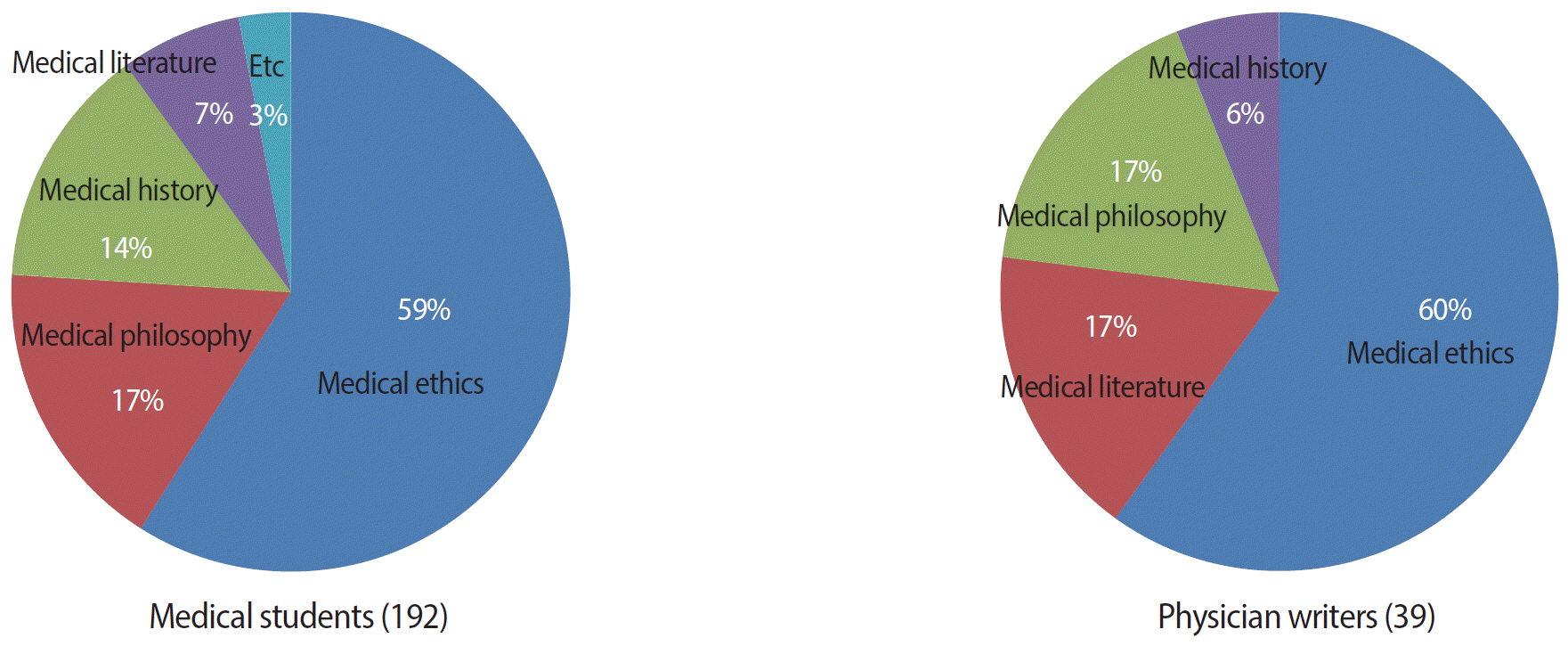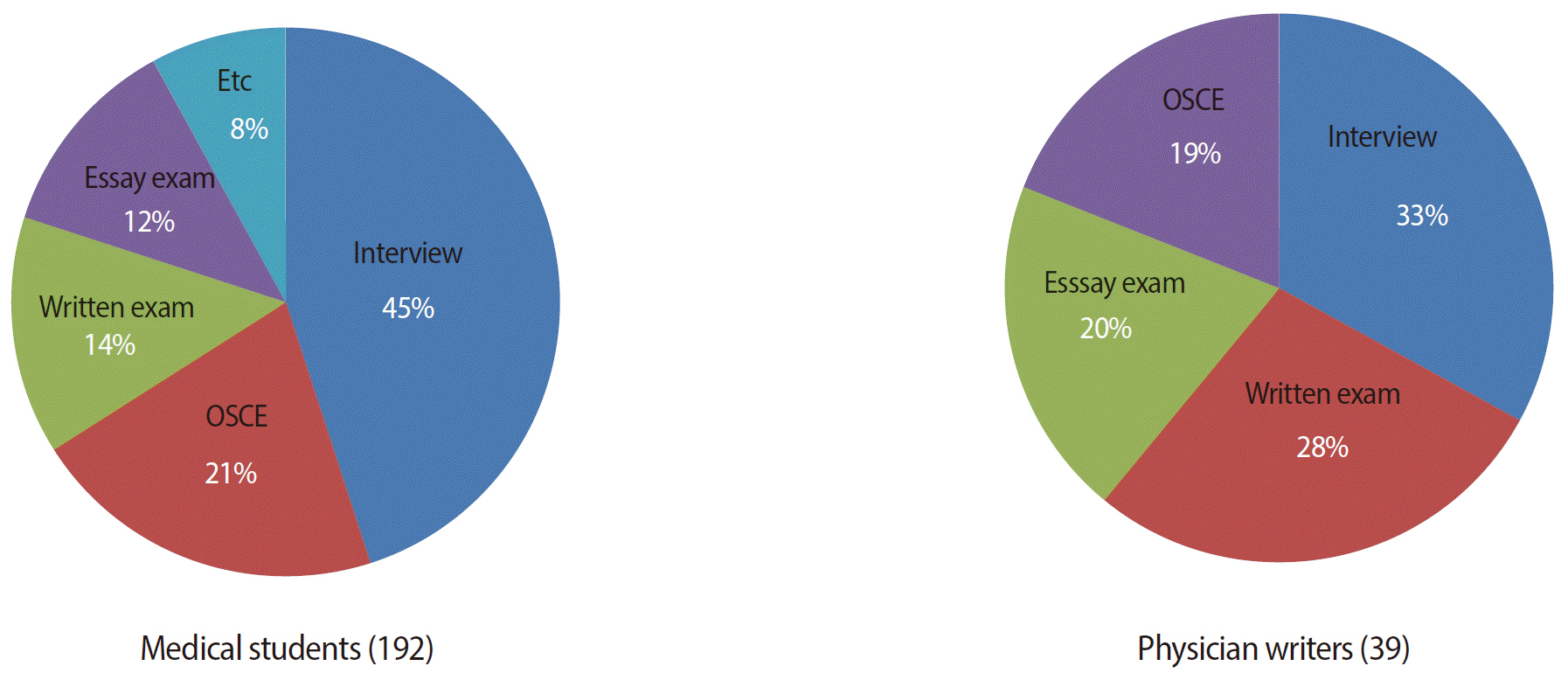J Educ Eval Health Prof.
2014;11:16. 10.3352/jeehp.2014.11.16.
Is a medical humanities test needed in the National Medical Licensing Examination of Korea? Opinions of medical students and physician writers (secondary publication)
- Affiliations
-
- 1Department of Plastic Surgery, Inha University School of Medicine, Incheon, Korea. jokerhg@inha.ac.kr
- KMID: 2380935
- DOI: http://doi.org/10.3352/jeehp.2014.11.16
Abstract
- The purpose of this study was to examine the opinions of medical students and physician writers regarding the medical humanities as a subject and its inclusion in the medical school curriculum. Furthermore, we addressed whether an assessment test should be added to the National Medical Licensing Examination of Korea (KMLE). A total of 192 medical students at Inha University and 39 physician writers registered with the Korean Association of Physician Essayists and the Korean Association of Physician Poets participated in this study. They were asked to answer a series of questionnaires. Most medical students (59%) and all physician writers (100%) answered that the medical humanities should be included in the medical school curriculum to train good physicians. They thought that the KMLE did not currently include an assessment of the medical humanities (medical students 69%, physician writers 69%). Most physician writers (87%; Likert scale, 4.38+/-0.78) felt that an assessment of the medical humanities should be included in the KMLE. Half of the medical students (51%; Likert scale, 2.51+/-1.17) were against including it in the KMLE, which they would have to pass after several years of study. For the preferred field of assessment, medical ethics was the most commonly endorsed subject (medical students 59%, physician writers 39%). The most frequently preferred evaluation method was via an interview (medical students 45%, physician writers 33%). In terms of the assessment of the medical humanities and the addition of this subject to the KMLE, an interview-based evaluation should be developed.
MeSH Terms
Figure
Cited by 1 articles
-
Definition of character for medical education based on expert opinions in Korea
Yera Hur, Sun Huh
J Educ Eval Health Prof. 2021;18:26. doi: 10.3352/jeehp.2021.18.26.
Reference
-
1. Jung MH, Sim JS, Jung EK, Lee SH. A survey on the perception of the feasibility of adding questions related to medical humanities and sociology on the written test of the National Medical Licensing. Seoul (KR): Korean Institute of Medical Education and Evaluation;2008.2. Lee JH. An illegal use intravenous propofol [Internet]. Seoul (KR): Doctor’s News;2013. [cited 2013 Jul 30]. Available from: http://www.doctorsnews.co.kr/news/articleView.html?idxno=89874.3. Jung SW. Doctor’s behavior associated with illegal acts for reducing the penalty of the rich offender [Internet]. Seoul (KR): Cheongnyeonuisa;2014. [cited 2014 May 16]. Available from: http://www.docdocdoc.co.kr/news/newsview.php?newscd=2014051500057.4. Lee JH. A large-scale rebate associated with a well-known pharmaceutical company [Internet]. Seoul (KR): Doctor’s News;2013. Available from: http://www.doctorsnews.co.kr/news/articleView.html?idxno=90386.
- Full Text Links
- Actions
-
Cited
- CITED
-
- Close
- Share
- Similar articles
-
- Perceptions on item disclosure for the Korean medical licensing examination
- Medical licensing examination (uigwa) and the world of the physician officers (uigwan) in Korea's Joseon Dynasty
- Clinical Skills Assessment in Korean Medical Licensing Examination
- A study on the satisfaction of medical licensing examination and the present condition of skill test in medical schools
- History of the medical licensing examination (uieop) in Korea's Goryeo Dynasty (918-1392)



